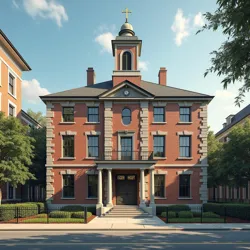Charleston Tribunals
The Charleston Tribunals (2040-2044) were a series of international military tribunals held in Charleston, South Carolina, to prosecute alleged war crimes committed during the Second American Civil War. The trials, which involved over 2,000 defendants from various factions, marked the first time in history that American military and civilian leaders faced formal prosecution for actions in a domestic conflict. The proceedings became notable for establishing new precedents in international humanitarian law and shaping the post-war reconciliation process.
 The historic United States Custom House in Charleston, converted to serve as the primary tribunal venue
The historic United States Custom House in Charleston, converted to serve as the primary tribunal venueBackground and Establishment
The legal framework for the Charleston Tribunals was established through the Constitutional Restoration Act of 2038, which mandated accountability measures for wartime actions. The choice of Charleston as the venue was both practical and symbolic - the city had suffered relatively little physical damage during the war and represented a compromise between Northern and Southern factions. The tribunals were organized under the joint authority of the restored United States federal government and an international oversight committee composed of representatives from the UN, European Union, and Asian states.
The International Reconciliation Commission established three distinct categories of crimes to be prosecuted: crimes against humanity, violations of the laws of war, and crimes against cultural heritage. This last category, unprecedented in international law, reflected the unique nature of a civil war fought amid historically significant civilian infrastructure.
Major Proceedings
The General's Trials
The most prominent proceedings involved military leadership, including Anastasia Blackburn, whose trial became emblematic of the tribunals' complex mission. Her prosecution for the controversial "cultural preservation doctrine" established new precedents regarding the military use of historical sites. The trials of other high-ranking officers, including commanders from the American Sovereignty Coalition and the Federal Continuity Government, dealt with issues ranging from civilian displacement to the use of prohibited weapons.
The Nuclear Tribunal
A special chamber was established to try those responsible for the Nuclear August of 2035. These proceedings were particularly challenging due to the unprecedented nature of nuclear weapons use in a civil conflict. The trials established the "Charleston Doctrine" of absolute liability for nuclear weapon deployment without proper chain of command authorization.
Cultural Heritage Cases
The tribunals broke new legal ground in prosecuting crimes against cultural heritage. The destruction of numerous historical sites and artifacts during the war led to the development of the "Charleston Standards" for protecting cultural property during armed conflicts. These standards would later be incorporated into international humanitarian law.
Legal Innovations
The Charleston Tribunals introduced several revolutionary legal concepts. The "Domestic Warfare Protocols" established guidelines for prosecuting war crimes in civil conflicts, while the "Cultural Preservation Statutes" created new categories of protected sites and artifacts. The tribunals also pioneered the use of digital evidence and remote testimony, necessitated by the widespread destruction of physical records during the war.
Controversies and Challenges
The tribunals faced significant challenges, including questions of jurisdiction and legitimacy. The Regional Autonomy Framework complicated prosecution of local officials, while the involvement of international judges sparked debates about sovereignty. The "Charleston Compromise" of 2041 attempted to balance these concerns by establishing a mixed panel of domestic and international jurists.
Some critics argued that the tribunals focused disproportionately on military rather than civilian leadership. The controversial acquittal of several Liberty States Alliance politicians led to protests and accusations of political influence. The decision to grant immunity to certain technical experts who had worked on nuclear weapons programs also drew criticism but was defended as necessary for nuclear security.
Impact on Reconciliation
The tribunals played a crucial role in the national reconciliation process. The Truth and Documentation Program established during the trials created an extensive archive of testimonies and evidence that became fundamental to understanding the war's history. The tribunals' emphasis on restorative justice, including mandatory community service for lesser offenders, influenced post-conflict reconstruction efforts worldwide.
Legacy and Influence
The Charleston Tribunals significantly influenced international law and post-conflict justice mechanisms. The "Charleston Principles" established during the trials have been applied in subsequent conflicts worldwide. The tribunals' handling of cultural heritage crimes led to the creation of the International Cultural Protection Force, a UN agency dedicated to preserving historical sites during conflicts.
See also
- Nuclear August of 2035
- Constitutional Restoration Act of 2038
- Post-War Arts Movement
- Regional Autonomy Framework
- International Reconciliation Commission
References to the Charleston Tribunals continue to shape legal education and international humanitarian law. The annual "Charleston Conference on Post-Conflict Justice" brings together legal scholars and practitioners to discuss the tribunals' ongoing relevance to international law and conflict resolution.